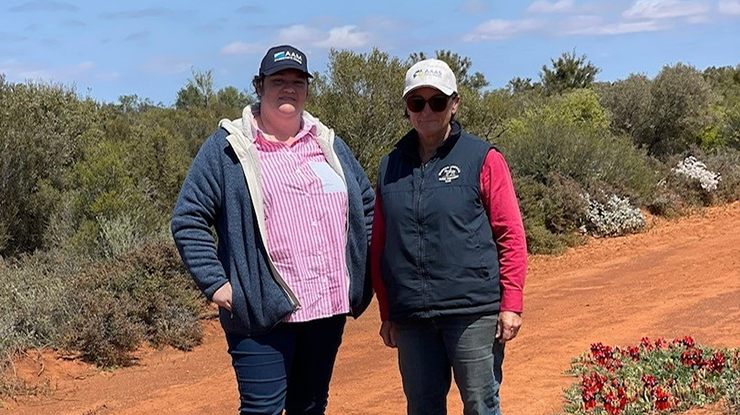 Student/producer pair Kaitlyn Anderson and Debbie Dowden
Student/producer pair Kaitlyn Anderson and Debbie Dowden
Farm-a-Friend, a program connecting agricultural science students with producers, is helping to build a stronger future for the red meat industry's workforce.
Launched in 2022 at the Livestock Matters event in Fremantle, the MLA and WA Livestock Research Council (WALRC)-supported initiative aims to aid agricultural science students to find work by developing relationships with grassroots producers and experts in the sector.
WALRC Chairman, Bronwyn Clark, said Farm-a-Friend allows the red meat industry to achieve its objective of building its 'people resources'.
"There's no guarantee that agricultural science students will go into the red meat industry, so programs like this are important in not only encouraging them to enter the field but providing them with the tools and contacts they need," Bronwyn said.
Student/producer pairings off to a great start
The inaugural Farm-a-Friend Program began with a few simple steps:
- Interest was registered at the initial networking event in Fremantle (those unable to attend were able to register via phone).
- Students shared their interests and were matched with a suitable producer.
- A senior researcher was assigned to join the student/producer pair for a chat.
- Students could visit their producer's farm – ideally at least twice over 12 months – to see first-hand how their business operated.
The program has now seen several students return to do holiday work with their producers, with others gaining postgraduate jobs because of the program.
Many students also paired with a second producer to expand their industry knowledge.
"Overall, the response we received was quite incredible," Bronwyn said.
"Even when the initial networking event had finished, the students and producers continued to stay at their assigned table talking."
So far, the program has connected 14 student/producer pairs who have all remained in contact (with many planning to meet again this winter).
Nurturing ag's future leaders
Based at 'Challa Station', 600km north of Perth, Debbie and Ashley Dowden saw the Farm-a-Friend program as an opportunity to connect with the next generation of agricultural scientists.
For Debbie, joining the program and partnering with Murdoch University student Kaitlyn Anderson was a chance to share her knowledge of running a beef enterprise and Human Induced Regeneration Carbon Project.
"I really feel producers have a responsibility to help nurture young people who are enthusiastic about agriculture.
"A lot of times, students who get involved in programs like Farm-a-Friend are not from agricultural communities and are looking for an opportunity to view how producers are doing things – especially in the more challenging climate areas such as the (WA) Southern Rangelands," Debbie said.
For Kaitlyn, her studies in animal science with a science communication minor paired well with the opportunity and experience she would gain.
"Because I'm not from a farming background, I found I didn't have that person I could call and ask questions about what I'm learning in class. To have someone I could check in with to see how they are applying certain practices, or even about how those practices are applied on-farm, was something I saw aiding my learning experience.
"After just one day of visiting, I had learnt a lot. I saw firsthand how their carbon project operated, I got to see how environmental challenges were being met and I was introduced to a lot of technology I had not seen in practice before.
"I plan to head back for another visit during winter. It was very hot when I was last there which meant not a lot of animal husbandry procedures were being held, so I'm looking forward to returning during a busier time for Ash and Debbie," Kaitlyn said.
Multi-generational sharing of knowledge
Debbie said her experience was a reciprocal affair in terms of sharing knowledge.
"For students, it's so important to connect and develop relationships with producers because it opens that door to open communication.
"Once that relationship is formed, even after graduation, students can comfortably contact those producers to ask questions, follow up on leads or share information of studies."
Going forward, Debbie says she will continue to work and connect with Kaitlyn.
"Kaitlyn will be visiting again later this year and I'm looking forward to catching up with her because it's clear she has so much to offer the industry.
"I hope we can continue to share each other's skills and expertise, and maybe even offer Kaitlyn employment with our grower group in the future, as she would be an asset in what we do," Debbie said.
Kaitlyn said she strongly urges producers to get involved in the program.
"If producers do have the opportunity to mentor someone, I would highly recommend it. It gives them an opportunity to be heard because we as students are going to be the next generation of agricultural scientists."
For all parties involved, the Farm-a-Friend is an opportunity to learn, grow and connect within the industry and give back to all parts of the community.
"I think a lot of producers are unaware of the level of practical work we do at university. So, I think this gives a bit of an insight into what the next generation is looking at doing for the industry.
"This way, we will learn from them and then in five to ten years when we're leaders in our fields, we will be able to give back," Kaitlyn said.






